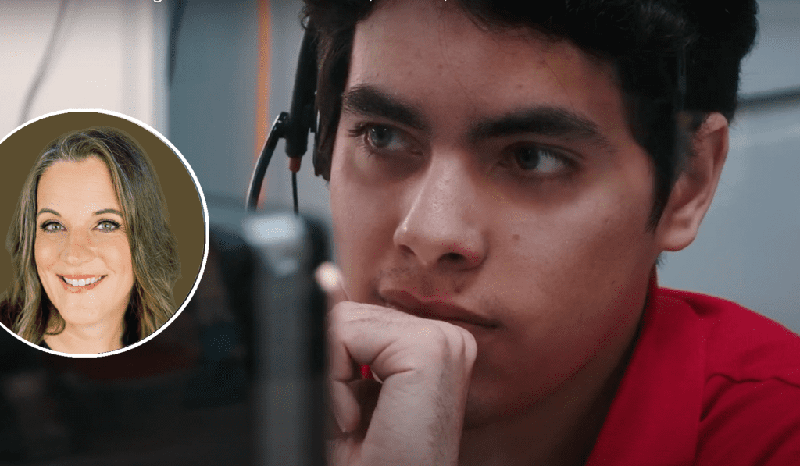

occupational therapy for neurodiverse students—what’s that?
by Karen Keptner
Students on the spectrum may seek and be offered a range of supports to make college life do-able. One option may be OT, or occupational therapy.
IN MY WORK AS AN OCCUPATIONAL THERAPIST, I’ve encountered many neurodiverse students with difficulties adjusting to college life. Here’s a crash course in the basics of what OT is, and how some OT could help you as you navigate college life
what is occupational therapy?
Occupational therapy focuses on helping people improve their participation in daily living activities. For college students, daily living activities might include:
home management
Keeping a dorm room clean, doing laundry, going grocery shopping, or getting around the community

personal health
Taking care of personal health: keeping a good sleep schedule, participating in physical activity, eating well, and/or monitoring medications and how they impact routines and school work
downtime
Leisure time and downtime /hobbies
time management
Prioritizing and breaking down course work, organizing syllabi and course materials, time management
communication
Communicating with professors and peers, developing peer and intimate relationships / sexual activity.
Occupational therapists look first at the strengths that a student has to be successful, and they can identify specific challenges that cause difficulty in everyday living like:
sensory dysfunction
Sensory dysfunction – the way that a student responds to sensory stimuli in the environment
executive function
Executive function – the way that a student organizes and plans their time
emotional regulation
Emotional regulation or coping skills
OCCUPATIONAL THERAPISTS focus on strengthening daily living skills to help students participate in a wider range of activities – which can improve mental health and quality of life.

What might an occupational therapist do with an autistic student?
Occupational therapists understand the physical, social, sensory, and psychosocial components of daily living activities to help problem solve challenges in the environment—like spaces that are physically demanding or have overwhelming sensory stimuli. An occupational therapist can give students strategies to enhance support in certain environments or, help them figure out ways to get their needs met in alternative ways. Occupational therapists can also help students practice a range of skills needed for daily living—figuring where to go for help, practicing social interactions, trying out new ways to cope in stressful situations or managing their routine to support their needs.
No activity is too small—need to get into a better shower routine? Having difficulty organizing days? Want to be a better pet mom? Want to make new friends? An OT can be an expert troubleshooter for these daily living challenges.

No activity is too small—occupational therapists can help students practice a range of skills needed for daily living
how to find an occupational therapist
A regular primary care physician can provide a referral to occupational therapy. There are also networks of occupational therapists who work with adolescents and young adults. For college students, it’s important to find an occupational therapist who has experience with adolescents and young adults and experience with autistic individuals.
When choosing an occupational therapist to work with, look for someone who is willing to:
intake eval
Conduct a comprehensive intake evaluation—the occupational therapist should work with students to understand their needs, desires, and difficulties;
create goals
Create collaborative goals that are measurable and meaningful to the student;
one-on-one, or group?
Offer one-on-one treatment or group treatment and explain the value of each type of treatment;

natural environment
Provide an environment where clients can work in natural environments;
ask questions
Ask questions, and encourage the client to do the same;
work together
Work with the student collaboratively—recognizing the importance of lived experience.
STUDENTS WORKING WITH AN OT get to practice the skills they need to be successful with someone who understands the challenges they might be facing – and we don’t just tell you what to do, we work with you! If you are having trouble adjusting to college life or managing the demands of school- working with an OT might be a good option for you.
If you are having trouble adjusting to college life or managing the demands of school—working with an OT might be a good option for you.
occupational therapy for neurodiverse students—what’s that?
by Karen Keptner
Students on the spectrum may seek and be offered a range of supports to make college life do-able. One option may be OT, or occupational therapy.
IN MY WORK AS AN OCCUPATIONAL THERAPIST, I’ve encountered many neurodiverse students with difficulties adjusting to college life. Here’s a crash course in the basics of what OT is, and how some OT could help you as you navigate college life
what is occupational therapy?
Occupational therapy focuses on helping people improve their participation in daily living activities. For college students, daily living activities might include:
home management
Keeping a dorm room clean, doing laundry, going grocery shopping, or getting around the community

personal health
Taking care of personal health: keeping a good sleep schedule, participating in physical activity, eating well, and/or monitoring medications and how they impact routines and school work
downtime
Leisure time and downtime /hobbies
time management
Prioritizing and breaking down course work, organizing syllabi and course materials, time management
communication
Communicating with professors and peers, developing peer and intimate relationships / sexual activity.
Occupational therapists look first at the strengths that a student has to be successful, and they can identify specific challenges that cause difficulty in everyday living like:
sensory dysfunction
Sensory dysfunction – the way that a student responds to sensory stimuli in the environment
executive function
Executive function – the way that a student organizes and plans their time
emotional regulation
Emotional regulation or coping skills
OCCUPATIONAL THERAPISTS focus on strengthening daily living skills to help students participate in a wider range of activities – which can improve mental health and quality of life.

What might an occupational therapist do with an autistic student?
Occupational therapists understand the physical, social, sensory, and psychosocial components of daily living activities to help problem solve challenges in the environment—like spaces that are physically demanding or have overwhelming sensory stimuli. An occupational therapist can give students strategies to enhance support in certain environments or, help them figure out ways to get their needs met in alternative ways. Occupational therapists can also help students practice a range of skills needed for daily living—figuring where to go for help, practicing social interactions, trying out new ways to cope in stressful situations or managing their routine to support their needs.
No activity is too small—need to get into a better shower routine? Having difficulty organizing days? Want to be a better pet mom? Want to make new friends? An OT can be an expert troubleshooter for these daily living challenges.

No activity is too small—occupational therapists can help students practice a range of skills needed for daily living
how to find an occupational therapist
A regular primary care physician can provide a referral to occupational therapy. There are also networks of occupational therapists who work with adolescents and young adults. For college students, it’s important to find an occupational therapist who has experience with adolescents and young adults and experience with autistic individuals.
When choosing an occupational therapist to work with, look for someone who is willing to:
intake eval
Conduct a comprehensive intake evaluation—the occupational therapist should work with students to understand their needs, desires, and difficulties;
create goals
Create collaborative goals that are measurable and meaningful to the student;
one-on-one, or group?
Offer one-on-one treatment or group treatment and explain the value of each type of treatment;

natural environment
Provide an environment where clients can work in natural environments;
ask questions
Ask questions, and encourage the client to do the same;
work together
Work with the student collaboratively—recognizing the importance of lived experience.
STUDENTS WORKING WITH AN OT get to practice the skills they need to be successful with someone who understands the challenges they might be facing – and we don’t just tell you what to do, we work with you! If you are having trouble adjusting to college life or managing the demands of school- working with an OT might be a good option for you.